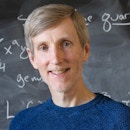- Speaker
-
 Andrew Sutherland, Ph.D.Principal Research Scientist, Massachusetts Institute of Technology
Andrew Sutherland, Ph.D.Principal Research Scientist, Massachusetts Institute of Technology
Presidential Lectures are a series of free public colloquia spotlighting groundbreaking research across four themes: neuroscience and autism science, physics, biology, and mathematics and computer science. These curated, high-level scientific talks feature leading scientists and mathematicians and are designed to foster discussion and drive discovery within the New York City research community. We invite those interested in these topics to join us for this weekly lecture series.
Computers play an increasingly important role as research tools for mathematicians. The advent of cloud computing has made massively parallel computation available at an unprecedented scale.
In this lecture, Andrew Sutherland will discuss how mathematicians can harness this new resource as a powerful observational instrument that illuminates previously inaccessible regions of the mathematical universe. He will describe what is believed to be the single largest scientific computation ever conducted on a cloud computing platform, using 580,000 cores to complete a 300-year computation in less than 12 hours. This computation was part of an effort to build a database of mathematical objects that lie on one side of the conjectured “Langlands correspondence,” and to address open questions in arithmetic geometry by finding several objects that were predicted, but notably absent, from previous tabulations. While the increasing availability of computational resources played an essential role in this work, algorithmic advances driven by mathematical breakthroughs have easily outpaced Moore’s law over the last two decades.
